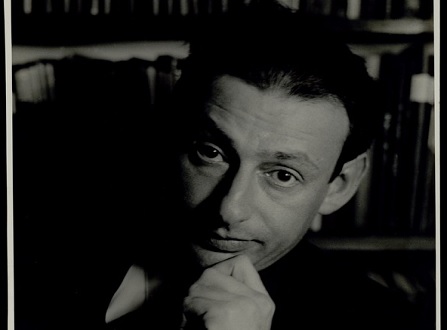Gershom Scholem
Gershom Scholem (1897–1982) was the world’s preeminent scholar of Kabbalah and Jewish mysticism. Over the course of his professional life, Scholem published hundreds of books and articles on Jewish mysticism, and trained the next generation of prominent Kabbalah scholars. Scholem’s research and thought wielded tremendous influence in their respective fields, and yet there were many who disagreed with his views.
Gershom (Gerhardt, in German) was the fourth child born to Arthur and Betty Scholem, owners of a printing house in Berlin, Germany. A somewhat assimilated bourgeois Jewish family, as part of the Scholem’s weekly routine, Gershom’s mother would light Shabbat candles at sundown on Friday, and his father would then use them to light his cigarettes. Scholem’s father also worked on Yom Kippur, which was unconventional even among their social set. Yet, his father objected to intermarriage and Gershom’s brother Werner’s marriage to a non-Jewish woman was not well received.
In this complex cultural atmosphere, the adolescent Scholem sought to learn more about his Jewish identity by reading about Judaism and finding teachers with whom he studied the Bible, the Talmud and the Hebrew language. For a short time, he became observant, joining the ultra-Orthodox Agudat Israel youth movement. Later he actively campaigned against the First World War, which led to a clash with his father who saw himself as a German patriot. Scholem then took up Zionism, and decided to prepare for immigration to the Land of Israel. When he began his university studies, he enrolled in mathematics with the intention of making a living as a teacher in Mandatory Palestine.
In his youth, Scholem was very impressed by historian Heinrich Graetz’s writings about the history of the Jewish people, and particularly his criticisms of Kabbalah. Scholem believed that Kabbalah was at the center of Judaism’s spiritual essence, and decided to explore it through scientific tools. He abandoned mathematics, and in 1922 completed his doctorate at the University of Munich with a dissertation on the ancient Kabbalistic book Sefer Habahir ("Book of Illumination"). The next year, his father published the young Scholem’s research in his printing house.
Scholem’s Research and Writings
Scholem immigrated to Mandatory Palestine in 1923 and brought with him about 2,000 books, 603 of them related to Kabbalah. His first job was to oversee the National Library’s collection of Jewish books. As part of his work, he devised a new cataloging system for Jewish subjects based on the Dewey Decimal System. Implementation of the new system began in 1927, the last year he worked at the Library.
With the opening of the Hebrew University in 1925, he joined as a lecturer and later was appointed full professor, becoming one of the world’s leading scholars of Jewish studies. Scholem’s early research focused mainly on bibliographic issues such as identification of manuscripts and mapping Kabbalist literature. Although he himself did not purchase manuscripts, he photographed many works from libraries around the world and had them bound and added to his personal library. He later delved into historical and ideological aspects of Kabbalah and studied Kabbalistic theology, but he was less interested in practical mysticism.




